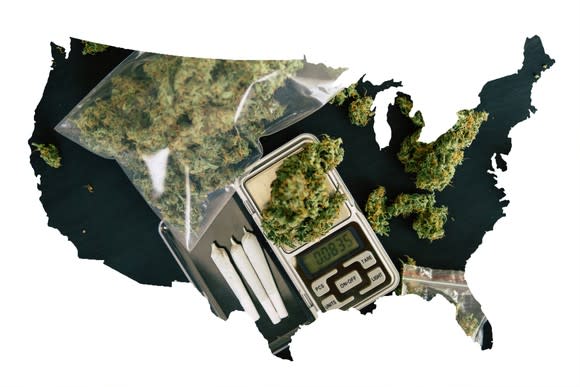The Must-See Marijuana Commentary From the U.S. Surgeon General
Last year, the cannabis industry gained validation like never before. For the first time ever, an industrialized country legalized recreational marijuana, with Canada ending nine decades of prohibition and lifting the curtain on what should be billions of dollars in added annual sales by the early part of the next decade.
It also was a year of advancement in the U.S., with the Food and Drug Administration (FDA) approving the first cannabis-derived drug, a number of states giving the green light to marijuana in some capacity, and President Trump signing the Farm Bill into law. The Farm Bill legalized hemp and hemp-based cannabidiol oil.

Image source: Getty Images.
Cannabis is stuck in neutral in the U.S.
But in spite of all this, the marijuana industry in the U.S. remains stuck in neutral. Cannabis is still a Schedule I drug in the U.S., meaning it's wholly illegal, prone to abuse, and not recognized as having any medical benefits. Even with 32 states legalizing pot in some capacity, this scheduling creates a lot of problems for weed businesses operating domestically.
For example, domestic cannabis companies are subject to U.S. tax code 280E, which was introduced all the way back in 1982. In short, businesses that sell a federally illicit substance are disallowed from taking normal corporate income tax deductions, save for cost of goods sold, which is usually only a small percentage of total sales. This can lead to an effective tax rate on corporate income of up to 90%, which can constrain hiring and business expansion.
U.S. marijuana companies also have limited or no access to basic banking services. Even with the federal government taking a hands-off approach to regulating the cannabis industry, banks are concerned with the possibility of facing criminal and/or financing penalties for providing banking services to pot-based companies. This can leave weed businesses in the U.S. struggling to find funding.
Medical research companies can suffer, too. The drug's Schedule I classification creates a lot of red tape that can seriously reduce benefit-versus-risk analysis and clinical studies. This analysis is what lawmakers in Congress have requested to better understand marijuana and consider it for rescheduling or de-scheduling.

Image source: Getty Images.
America's top doctor addresses marijuana's medical-research challenges
These challenges, at least on the medical front, aren't falling on deaf ears. According to CTV News, U.S. Surgeon General Jerome Adams has a more progressive view on marijuana research. While speaking at a law-enforcement conference at Harvard University in Boston, Massachusetts in December, the nation's top doctor called for regulators to rethink how drugs are scheduled in this country. Said Adams:
We need to look at our health laws, rules and regulations, and that includes the scheduling system. I'll take it somewhere else -- marijuana. We need to look at the way we schedule different medications across the board. One of the concerns I have with marijuana is the difficulty folks have to do research on it because of the scheduling system... We have to look at how we can continue to change the scheduling system so that it promotes safety, so to that it promotes health for all, and so that it doesn't inhibit research, doesn't inhibit exploration of potential options for folks.
Adams' words are more important than ever after GW Pharmaceuticals' (NASDAQ: GWPH) lead drug Epidiolex became the first cannabis-derived medicine to gain approval from the FDA in 2018. GW Pharmaceuticals' Epidiolex is a cannabidiol-based oral solution that treats two rare forms of childhood-onset epilepsy, Dravet syndrome and Lennox-Gastaut syndrome. In multiple late-stage trials, Epidiolex easily ran circles around the placebo in terms of reducing seizure frequency from baseline. GW Pharmaceuticals launched its lead therapy just over two months ago.
Not only does GW Pharmaceuticals' approval contradict the thesis that Schedule I drugs have no medical benefits, but the U.S. Drug Enforcement Agency (DEA) classified Epidiolex as Schedule V, which is the least restrictive classification given by the DEA. In other words, there's a compelling case cannabis does have medical benefits and that its benefits and risks are worth exploring. In order for that to happen, though, the existing red tape would have to be dealt with.

Image source: Getty Images.
A congressional stalemate
With a record 2 out of 3 Americans in Gallup's latest poll in favor of legalizing marijuana, and well over 90% supportive of medical cannabis being prescribed by a physician in an April 2018 survey from the independent Quinnipiac University, you might be wondering why the federal government hasn't moved to loosen regulations surrounding cannabis. The answer is twofold.
The initial reason why the cannabis stalemate continues in Washington is that it's simply not enough of a polarizing issue to move the political needle. Sure, a majority of the American public wants to see marijuana legalized, but only 13% of surveyed adults were willing to remove their support for a political candidate if the candidate's views on pot didn't match their own. Meanwhile, 82% of respondents in the April Quinnipiac poll still were willing to vote for that candidate, even if he or she didn't promote a cannabis policy that aligned with their own. Until weed is a polarizing-enough issue, the push for change could stall on Capitol Hill.
The other problem remains money -- albeit this is a broad-based legalization issue and one that's not tied solely to medical marijuana research. As noted, Schedule I drugs are subject to Section 280E of the tax code. Even though the federal government holds marijuana to be illegal, it's still more than willing to collect income tax revenue from weed-based companies.
By adjusting marijuana's scheduling or removing it from the controlled substances list, it would no longer subject cannabis companies to 280E. Over the course of a decade, the federal government would lose out on an estimated $5 billion in aggregate tax revenue as a result. That's not a lot of money, all things considered, but it's a problem when the federal government continues to run an annual budget deficit.
The calls for change are growing louder, but any chance for a major advancement at the federal level still seems unlikely in 2019.
More From The Motley Fool
Sean Williams has no position in any of the stocks mentioned. The Motley Fool has no position in any of the stocks mentioned. The Motley Fool has a disclosure policy.

 Yahoo Finance
Yahoo Finance 